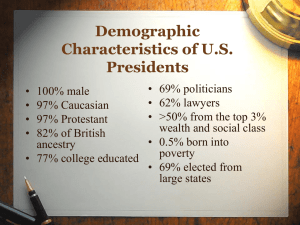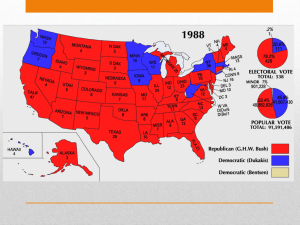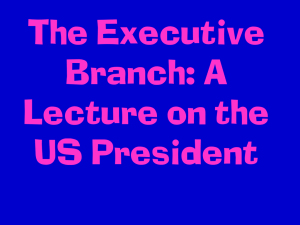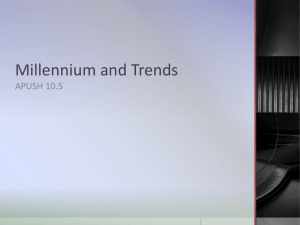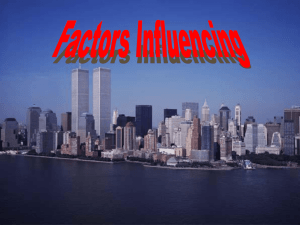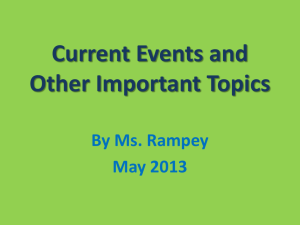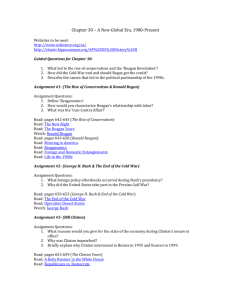1990-Present - Ms. McManamy's Class
advertisement
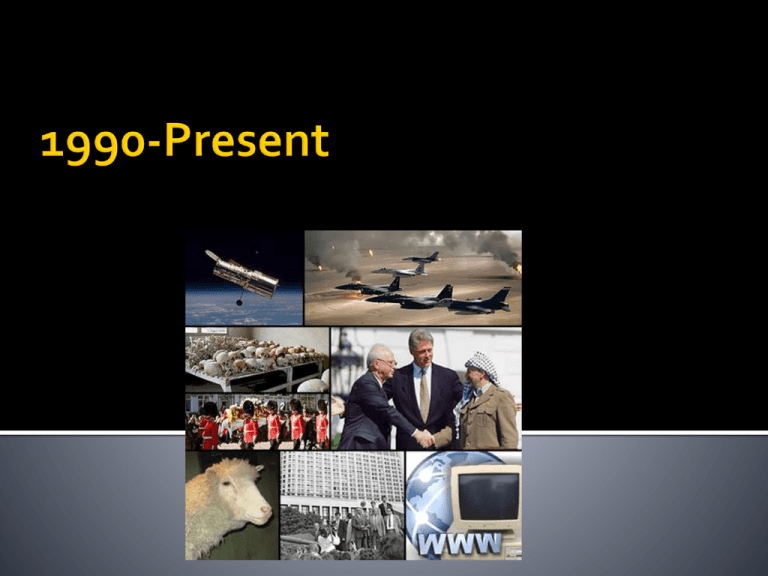
Served two terms as Reagan’s VP Promised to continue Reagan’s policies with greater compassion in dealing with homeless and poor Promised to improve education and fight drug use Previous experience mainly in foreign policy Had to reduce growing budget deficit Events in E. Europe and Soviet Union permitted cuts in military spending Late 1990, promised increase income taxes on wealthy but never able to make big reduction in budget deficit Impact of defense spending on US economy Experts disagree on impact Can provide short-term stimulus Can also divert resources from more productive uses Heavy military spending can mean less investment in peacetime projects Supreme Court Appointments Made several appointments to Supreme Court, leading to conservative majority Toughened rules for criminal defendants, reduced scope of abortion rights, and introduced other important changes Recession US gradually moved back into recession Economics blamed on reduced spending by consumers, corporations, and fed and state govts Greater foreign competition led to less demand for some American products 1970s-1980s saw increase population in Sunbelt, opposite for “Rust Belt” ▪ Areas of NE and Midwest with coal and iron ▪ Collapse of US steel industry to steady loss of manufacturing jobs to Mexico and overseas Civil Rights and Civil Unrest Recession hard on young African Americans Riots in Los Angeles and other cities in 1992 when jury found policeman not guilty even though videotaped beating young African American Rodney King Several killed Riots highlighted plight of minorities and continuing racial tensions Americans with Disabilities Act 1990 Prohibited discrimination against people with disabilities in employment and public accommodations Invasion of Panama, 1989 Bush took steps against Panamanian dictator and drug-dealer Manuel Noriega Sent US forces to Panama where restored democratically elected leaders Noriega captured and taken to US where tried and convicted on drug charges End of the Cold War, 1989-1991 1989-1991, E. Europe moved from Communism to democracy Berlin Wall torn down and Germany reunited 1991 – Soviet Union dissolved and replaced by Commonwealth of Independent States Bush recognized Russia and other newly independent republics and offered economic assistance http://youtu.be/7z6dxQVhE8o http://youtu.be/fK1MwhEDjHg http://youtu.be/zmRPP2WXX0U Gulf War, 1990 August 1990 Iraqi leader Saddam Hussein invaded Kuwait for oil and to extend Iraq’s borders Hussein refused requests from UN to withdraw UN forces under US leadership launched attack against Iraq Invasion succeeded in a few days Feb 1991, Hussein agreed to remove all troops from Kuwait and pay for damages Gulf War, 1990 Bush declared cease-fire but refused to remove Saddam from power First major challenge to world order after Cold War American prestige in Middle East greatly enhanced ▪ Bushed used this to initiate peace talks between Israel and neighbors in late 1991 Somalia 1992 – Bush began humanitarian airlift of food and supplies to Somalia in NE Africa Local warlords and bandits continued to steal supplies, Bush sent US troops in final month of Presidency Bill Clinton from poor Arkansas background Attended Yale Law School and met wife Hilary Clinton Governor of Arkansas 1992 – successfully united different groups within Democratic Party and attract independent voters Bush not doing enough to fight recession Third party candidate Ross Perot furthered weakened Bush’s authority Perot received 20% of vote, making him most successful third party candidate in history Clinton promised agenda of reform Found difficulty obtaining Congressional support Clinton had trouble passing early budgets First budget limited fed spending, increased income taxes to 40% for richest Americans, cut taxes for low-income Americans, and introduced fed gasoline tax Health Care Reform Promised to reform health care in campaign Give every American health insurance Hilary to head task force on health care ▪ Leading advocate for better health insurance for uninsured and underinsured Americans Many plans proposed but none passed by Congress Opponents feared Clinton’s proposal might to lead long waits and health care rationing Supporters shocked many Americans lacked health care Major defeat for Clinton Other policies “New Democrat” Supported welfare reform, free trade, lower taxes on middle class, and tough measure on crime Passed bull that increased funds for police depts, 5 day waiting period on buying handguns, increased fed money for prisons, and banned sales of assault weapons Economic Recovery Made easier to export computers and other high teach goods abroad by removing Cold War restrictions Helped grow computer-related industry and restore economy Reduction of military spending and closed military bases also boosted civilian economy Unemployment down, spending was up, and business profits at all-time high by end of presidency 1999 – Clinton balanced nation’s budget and had surplus Contact with America 1994 – Newt Gingrich, Republican Speaker of the House, proposed program of conservative principles in Contract with America ▪ Book length contract endorsed by most Republicans in attempt to win House during mid-term elections ▪ Argued that fed govt was too large and no longer responsive to people ▪ Fed programs took away personal responsibility from families and individuals ▪ Sought to restore balance between govt and citizens ▪ Many provisions concerned conduct of Congress Clinton had scandal in second term in office Senate conducted second impeachment trial of President Sexual affair uncovered between Clinton and White House intern Clinton had lied under oath about the affair Impeached by House but 2/3 vote in Senate to remove Clinton from office felt short Americans felt they could not trust elected leaders Yugoslavia, Bosnia, and Kosovo Yugoslavia in the Balkan Peninsula formed by joining several ethnic groups together after WWI Catholic Croats in SW, Bosnian Muslims in SE, Orthodox Christian Serbs in N End of Cold War renewed tensions which divided into separate states Dissolution of Yugoslavia was accompanied by fierce fighting between Muslim Bosnians and Christian Serbs Yugoslavia, Bosnia, and Kosovo Serbs attempted to massacre Muslim civilians in parts of Bosnia and Kosovo as part of “ethnic cleansing” Genocide like Holocaust might be repeated Clinton helped negotiate peace in Bosnia after use of NATO airstrikes against Serbia Clinton’s intervention led to compromise peace Participation in International Organizations Originally negotiated with President Bush, NAFTA (North American Free Trade Agreement) was push through Congress New trade association with Mexico and Canada Phased out tariffs between 3 countries Most economists believe free trade stimulates economy Critics says led to loss of manufacturing jobs where labor is cheaper and other countries don’t have the same regulations and laws Participation in International Organizations GATT (General Agreement on Tariffs and Trade) formed in 1947 to further trade 1994 replaced with World Trade Organization ▪ Establishes rules for global trade and help to settle trade disputes ▪ Accelerated globalization Participation in International Organizations Also in United Nations (UN), NATO, SEATO (Southeast Asia Treaty Organization), APEC (Asia-Pacific Economic Cooperation), and PAS (Organization of American States) China Clinton tried to protect human rights in China by proposing trade link Abandoned policy when had no effect on China except hurting US economic interests Continued to press for human rights reform but separate from trade 1999 US missiles accidently hit Chinese embassy in Yugoslavia Chinese nationalists marched on US embassy in Beijing No attempt to halt US-Chinese trade US officials helped China join WTO Russia Both Clinton and H.W. Bush Haitian military leaders threw out maintained friendly relations w/ Russian President Boris Yeltsin Jean-Bertrand Aristide, a priest who won UN supervised free elections in 1990 Clinton sent US troops to Haiti, resulting in his return to power in 1994 Israel Clinton administration worked for peace between Israel and PLO and Jordan Somalia US and UN unable to end fighting with rebel war lords Clinton withdrew US troops when no further progress in sight Haiti Iraq Clinton airlifted US troops to Middle East to pressure Saddam Hussein to withdraw Iraqi troops from along Kuwait border Later took steps to force Hussein to allow UN inspectors into Iraq to continue inspections for nuclear and biological weapons Bill Gates Co-founded of Microsoft One of first to recognize First Africa-American billionaire Founded of Black potential of personal computer Entertainment Television BET became first AfricanAmerican managed company listed on New York Stock Exchange Sam Walton 1962 created own five-and- dime store in Arkansas Vision to create chain store offering variety of products at low prices Walmart and Sam’s Club world’s largest retailer Robert Johnson Lionel Sosa Saw potential in Hispanic market Founded the largest Hispanic advertising agency in US Also advised several Republican Presidents Son of former President George H.W. Bush Governor of Texas from 1995-2000 Nov 2000, became President after winning majority of Electoral College in closest Presidential election in US history Al Gore was Clinton’s vice president Democrats weakened by Clinton’s impeachment scandal Gore hurt by third party candidate Ralph Nader and downturn of American economy Bush did better than expected n Presidential debates Gore won popular vote by half a million votes Some states margin so narrow winner of Electoral College remained unclear for weeks Bush appeared to have narrow lead in Florida, pending a final count If either candidate won Florida, where Bush’s brother was Governor, it would be enough to win Bush had carrier state, but after mandatory recount, lead was fewer than 1,000 votes Thousands of voters had not punched in holes of paper ballots to indicate candidate which led to question of accuracy Gore demanded a recount by hand in four Florida counties State officials refused and were supported by lower state court Certified Bush had won Gore appealed to Florida Supreme Court which demanded a statewide recount Bush appealed to US Supreme Court 5 to 4 vote, SC ruled an order to end the recount Florida Supreme Court had instruct those making the recount to evaluate the voter’s intent in cases where ballot was not fully punched in SC objected to this, arguing there was no consistent standards Critics felt SC had voted along party lines – 5 conservative vs 4 liberal Some felt it was acting against the will of the people, as expressed in the popular vote Bush pushed through tax cut to revitalize economy Federal Reserve Board dropped interest rates to lowest levels in decade Revived economy but brought return to high federal deficits Cuts mainly favored the wealthy but Bush said cuts were needed to get economy growing Bush introduced No Child Left Behind, requiring all states to test all students in English and math each year from 3rd to 8th grade September 11, 2001, Islamic Fundamentalist terrorists used planes to crash into the World Trade Center in New York City and Pentagon in Washington, DC. Final plan crashed in Shanksville, Pennsylvania 3,000 people killed, worst attack in US history Osama bin Laden and organization alQaeda took credit for attacks Bin Laden from wealthy Saudi Arabian family Soviet invasion in 1979 stirred Bin Laden to recruit Islamic soldiers from around the world Bin Laden was sheltered by Taliban controlled govt of Afghanistan after the attack Taliban refused to surrender bin Laden Bush vowed to launch global “War on Terror” Oct 2001, Bush ordered air and ground assaults which toppled Taliban and destroyed al-Qaeda’s bases Osama bin Laden eluded capture Took steps to curb terrorism at home New federal agency, Transportation Security Agency (TSA) took over security at US airports All passengers and luggage subjected to thorough screening 2003 – new cabinet post, Department of Homeland Security Keep US safe from all threats Range from nuclear detection and intelligence coordination to protection of high-level govt officials USA PATRIOT Act of 2001 Greatly expanded govt’s law enforcement powers Some 9/11 terrorists trained as pilots in US ▪ Had cell phones, computers, and bank accounts funded by international terrorists Law enforcement power to conduct sweeping searches and surveillance, detain immigrants, and monitor bank accounts Bush authorized National Security Agency (NSA) to wiretap suspected callers w/out first obtaining a warren Some felt it gave Executive Branch too much power “Warrantless” wiretaps later held unconstituional Imprisoned suspected terrorists captured at Guantanamo Bay in Cuba Rights required by US Constitution did not given to accused Prisoners on hunger strikes force-fed Department of Justice believed limited torture techniques like water-boarding were justified to get info Critics felt torture is rare successful or necessary Claimed prisoners treated inhumanely Wished to see Guantanamo Bay closed Bush and advisors feared dictator Saddam Hussein might provide weapons to terrorists Hussein had used chemical weapons in 1980s Hussein denied having Weapons of Mass Destruction (WMD) First refused to let UN inspectors in UN inspectors found no WMD Some question if investigation thorough enough US, Britain, and Spain warned Iraq to surrender weapons France, Germany, and Russia favored more cautious approach American leaders feared delay would allow him to hide weapons Bush gave Hussein 48 hours to leave Iraq or face invasion Hussein rejected Coalition forces took action US began campaign w/ air strikes Early April US forces captured Baghdad Hussein’s dictatorship quickly collapsed Hussein captured, tried for crimes against Iraqi citizens, and executed by Iraqis in 2006 Set up provisional govt in Iraq Early 2005 Iraqi voters elected representatives to draw up constitution Newly elected Iraqi national govt took power becoming first Arab democracy in Middle East War far from over Insurgency consisting of former supporters of Hussein, Shiite radicals, and Iraqis angry at foreign intervention arose Differences between ethnic groups of Iraq added to conflict Iraqi prisoners at Abu Ghraib prison were tortured and humiliated President Bush ran for second term against Senator John Kerry, outspoken critic of the war End of 2006, as many as 1,000 people still being killed each month in Iraq Bush announced new “surge” strategy, sending more than 20,000 additional US troops Surge greatly reduced violence in Iraq American withdrawal from Iraq became central issue in 2008 US Presidential election Also in Bush’s second term Hurricane led to evacuation and flooding of almost 80% of New Orleans and other parts of Guild Coast Storm surge greatly exceeded engineering design of New Orleans levees Costliest hurricane in history More than 1,800 people died in flooding One of deadliest natural disasters in America’s history Rescue efforts delayed so many found themselves stranded Stock market dropped sharply in 2000, Federal Reserve lowered interest rates to stimulate the economy Many took advantage to buy new homes Some banks lent money to borrowers who could not afford their homes House prices rose, leading to speculation in housing Mortgages were bundled with other investments and sold to banks or investors 2007 – overbuilding led to falling house prices Some had special mortgages that adjusted to higher interest rates Interest rates rose, some homeowners couldn’t afford mortgages Led to rising number of home foreclosures Federal govt gave rebates to taxpayers and businesses in Feb 2008 to stimulate the economy Sept 2008- fed govt took over the nation’s largest mortgage lenders Despite actions, financial crisis spiraled out of control Several securities and investment firms showed signs of collapsing Govt allowed investment firm of Lehman Brothers to fail Banks stopped lending and credit dried up for individuals and businesses Oct – Emergency Economic Stabilization Act (2008) authorized the Secretary of Treasury to spend up to $700 billion to buy distressed investments and to provide funds to banks to prevent them from failing Treasury and Fed Reserve provided emergency funding to insurance giant AIG, several brokerage houses, and the nation’s largest banks One of the hardest fought in US history Hilary Clinton seen as early Democrat forerunner Barack Obama emerged as nominee after one of the closest primary elections in history Republicans nominated John McCain – distinguished war record and former POW in Vietnam Obama received boost when Oprah Winfrey publicly endorsed him Promised health care reform Appealed to young people and African Americans Called to close Guantanamo Bay, promised citizenship for millions of undocumented aliens, and spoke against tax cuts for wealthiest Americans Obama became first AfricaAmerican elected President Campaigned for change Most costly Presidential campaign in US history Grassroots campaign through internet April 2009 – American Recovery and Reinvestment Act More than $700 billion spent in bailout package to create new jobs, save existing ones, spur economic activity, and invest in long-term infrastructure development Passed legislation to regulate credit cards, lending, and other banking practice Took steps to save US auto industry Health care reform passed Sonia Sotomayor first Hispanic Justice and third women on US Supreme Court Later Obama named Elena Kagan to US Supreme Court Pakistan Gradually withdrew troops Acts of terrorism still continue against Iraqi govt Increased level of US troops in effort to stabilize country Iran continues to develop nuclear weapons despite increased economic and political sanctions Iran sponsors terrorist groups in Middle East Obama discouraged dictators from using force to suppress democracy movements in Tunisia, Yemen, Syria, and Egypt In Library, authorized airstrikes to defend rebels, leading to Gaddafi’s downfall and death Israel Iran Maintained close ties w/ Europe European Union experienced own financial crisis similar to US “Arab Spring” Afghanistan Europe Iraq Encouraged Pakistan to take more aggressive stance in fighting terrorism US troops entered Pakistan and were able to track down and kill Osama bin Laden Seeks to work w/ Israelis and Palestinians to achieve two-state solution – Jewish state and Palestinian state living side-by-side in peace China Continues to export large number of goods to Americans while investors buy great deal of US Treasury Notes

